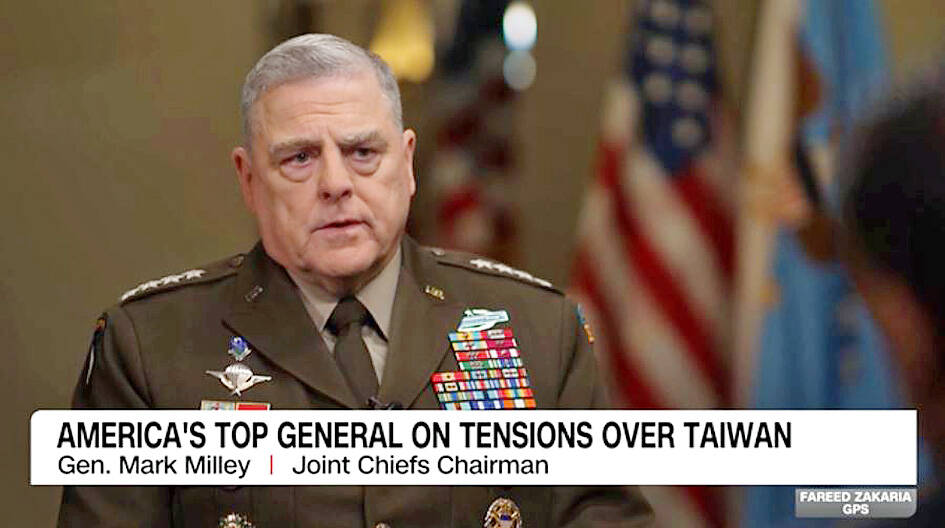China would be making “a grave strategic mistake” if it tried to attack Taiwan, US Joint Chiefs of Staff Chairman General Mark Milley said in an interview with CNN that aired on Sunday.
Asked by host Fareed Zakaria whether the US could repel a Chinese invasion of Taiwan, Milley said: “It is entirely possible.”
Milley reiterated that the US still maintains the Taiwan Relations Act, and that it wants “a peaceful outcome between Taiwan and the People’s Republic of China, and whatever that is between those two peoples.”

Photo: screen grab from CNN
“Militarily, I think China would make a grave strategic mistake if they attempted to attack to seize the island of Taiwan. That is not the only option, by the way,” he said. “But to attack and seize the island of Taiwan is a very, very high bar. It is the most complex of all operations to do.”
“Frankly, the Chinese military capability is probably not there right this second to do that,” he added. “[Chinese] President Xi [Jinping (習近平)] in public unclassified speeches has challenged the People’s Liberation Army and Navy and Air Force to develop that capability by 2027,” Milley said. “It used to be the 2030s and then he moved it to 2027. That does not mean he made a decision to do it, but that means that he wants them to have the capability to do it. What that also means is they do not have the capability right this second, at least in his mind.”
While China hopes to exceed the US’ military capabilities by the middle of this century, the US is not going to stand still, but would continue to modernize, he added.
“There is value in the phrase peace through strength. So the objective here is deterrence. You do not want a great power war,” he said. “We have not had one in 80 years and we need to make sure that it is avoided.”
“China can be evaluated in a lot of different ways, but great power is certainly what they are. They are economically and militarily capable, and we should try our very best to avoid open-armed conflict with China,” Milley said.

The combined effect of the monsoon, the outer rim of Typhoon Fengshen and a low-pressure system is expected to bring significant rainfall this week to various parts of the nation, the Central Weather Administration (CWA) said. The heaviest rain is expected to occur today and tomorrow, with torrential rain expected in Keelung’s north coast, Yilan and the mountainous regions of Taipei and New Taipei City, the CWA said. Rivers could rise rapidly, and residents should stay away from riverbanks and avoid going to the mountains or engaging in water activities, it said. Scattered showers are expected today in central and

People can preregister to receive their NT$10,000 (US$325) cash distributed from the central government on Nov. 5 after President William Lai (賴清德) yesterday signed the Special Budget for Strengthening Economic, Social and National Security Resilience, the Executive Yuan told a news conference last night. The special budget, passed by the Legislative Yuan on Friday last week with a cash handout budget of NT$236 billion, was officially submitted to the Executive Yuan and the Presidential Office yesterday afternoon. People can register through the official Web site at https://10000.gov.tw to have the funds deposited into their bank accounts, withdraw the funds at automated teller

COOPERATION: Taiwan is aligning closely with US strategic objectives on various matters, including China’s rare earths restrictions, the Ministry of Foreign Affairs said Taiwan could deal with China’s tightened export controls on rare earth metals by turning to “urban mining,” a researcher said yesterday. Rare earth metals, which are used in semiconductors and other electronic components, could be recovered from industrial or electronic waste to reduce reliance on imports, National Cheng Kung University Department of Resources Engineering professor Lee Cheng-han (李政翰) said. Despite their name, rare earth elements are not actually rare — their abundance in the Earth’s crust is relatively high, but they are dispersed, making extraction and refining energy-intensive and environmentally damaging, he said, adding that many countries have opted to

PEACE AND STABILITY: Maintaining the cross-strait ‘status quo’ has long been the government’s position, the Ministry of Foreign Affairs said Taiwan is committed to maintaining the cross-strait “status quo” and seeks no escalation of tensions, the Ministry of Foreign Affairs (MOFA) said yesterday, rebutting a Time magazine opinion piece that described President William Lai (賴清德) as a “reckless leader.” The article, titled “The US Must Beware of Taiwan’s Reckless Leader,” was written by Lyle Goldstein, director of the Asia Program at the Washington-based Defense Priorities think tank. Goldstein wrote that Taiwan is “the world’s most dangerous flashpoint” amid ongoing conflicts in the Middle East and Russia’s invasion of Ukraine. He said that the situation in the Taiwan Strait has become less stable